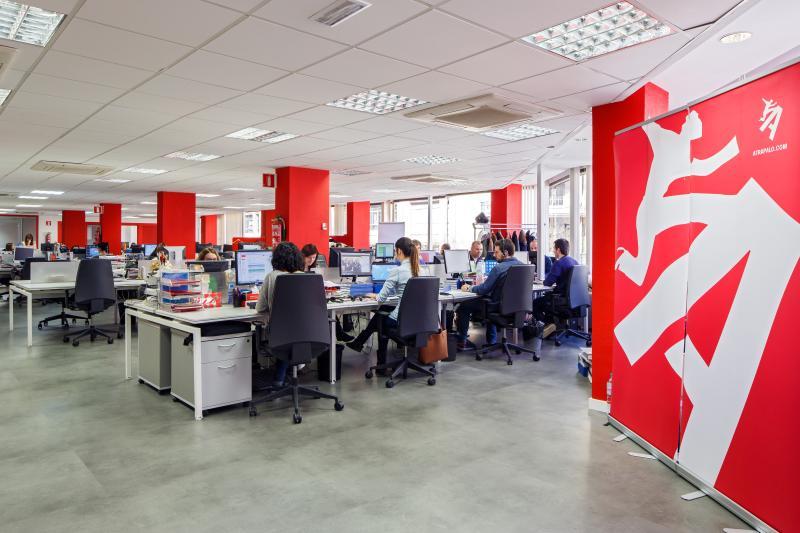Catalan bank aims to help nearly 50 000 people keep jobs, pay bills and survive during coronavirus economy downturn
By Lorenzo Squintani and Chris Knight
COVID-19 has dealt a heavy blow to many parts of the economy, but companies that rely on tourism or travel in particular are suffering. For many, financing backed by the European Investment Bank has been a lifeline.
“We believe that by 2021 things will improve, but we will have to work hard over the next few years and watch expenses closely,” says Rafael Ruiz, chief financial officer of the Barcelona Technical Centre, an engineering firm in Martorell, northwest of Barcelona, that has 148 employees and designs products for the automobile, aeronautics and railway sectors.
Ruiz’s company took out a €950 000 loan from the Institut Català de Finances, also called the ICF, the public Catalan bank for small businesses and entrepreneurs. “By receiving this loan, we have been able to keep paying salaries and cover other commitments, despite the drop in projects,” Ruiz says.
The Barcelona Technical Centre’s financial lifeline was made possible by a €250 million loan that the European Investment Bank signed with the ICF. The loan will help up to 48 000 people in retail, tourism, catering, culture and many other sectors pay bills and come up with new business plans. The EU bank and the ICF have been working closely to support thousands of small businesses in the region since 2008.
“We are on continuous alert for signs of recovery,” says Rafel Niubo, the general secretary of Eurofitness, a Barcelona company that manages and builds fitness and sports centres across Spain. Eurofitness has had a hard time during the pandemic and many gyms have closed.
Niubo is seeing some encouraging signs, but his goal now is just to keep the company going. Eurofitness, which has 327 employees, took out a €1 million ICF loan. With this assistance, it avoided salary cuts, redundancies or reduced customer service.
As many as 2 000 companies could qualify for loans from this European Investment Bank financing. Using the EU bank’s loan and investments from other public and private sources, the ICF plans to make up to €1 billion available to steer small businesses through the crisis.

Atrápalo, an online travel agency based in Barcelona, sees a lot of uncertainty for the future.
New models of business to respond to downfall
Josep-Ramon Sanromà, chief executive of the Catalan public bank, says his staff has been working intensely to offer new financing solutions to entrepreneurs.
“The crisis has had a strong impact on businesses in Catalonia during the lockdown,” he says. “Companies were paralysed, sales fell, and businesses were reoriented to respond to the new safety measures. Many companies, especially the self-employed and small firms, need greater financial support. We are helping them start new models of businesses that can relaunch their activities and boost the economy.”
Spain’s gross domestic product and employment rates fell substantially in 2020. Its economy relies more heavily than most other European countries on tourism and real estate transactions, two sectors that have especially struggled during COVID-19. Spain is starting to recover and its GDP is expected to rise in 2021, according to the International Monetary Fund.
“The economic impact has been severe in the country, but little by little we are starting to see the light at the end of the tunnel,” says Alex Saz-Carranza, a European Investment Bank loan officer who is working on transactions to jump-start many parts of Spain. “The Bank is supporting small businesses in Spain more than ever. We are working closely with our intermediaries to reach out to as many companies as we can to alleviate the economic effect caused by the pandemic and to allow businesses to stay alive and maintain jobs.”
Rapid response to the coronavirus crisis
This European Investment Bank loan agreement with the ICF was one of the first among dozens of large deals approved under a €5 billion EIB Group programme to help European businesses fight the crisis. The European Investment Bank approved this Spanish deal in a few months under an accelerated procedure to help small firms quickly.
The ElB Group is working on many fronts to combat the COVID-19 crisis – helping banks give loans, assisting hospitals and other public institutions to slow the spread of the virus, and giving pharmaceutical companies venture funding to develop COVID therapies and vaccines. The Bank created a €25 billion guarantee fund that is helping national development banks, commercial banks and other financial institutions make more money available for hundreds of thousands of struggling businesses of all sizes. This type of funding will mobilise many more billions of euros of investment to lift the economy.
The extra financing came just in time for companies such as Atrápalo, an online travel agency based in Barcelona that employs 220 people. Atrápalo took out a €500 000 loan from the Catalan public bank to help pay its staff and prepare for the unexpected.
“There is a lot of uncertainty for the future,” says Luis Alonso, chief financial officer of Atrápalo. “We do not know when or how fast travel, tourism and leisure activities will recover, but with this loan we are now able to manage these uncertainties and make up for the drop in activities during the pandemic.”